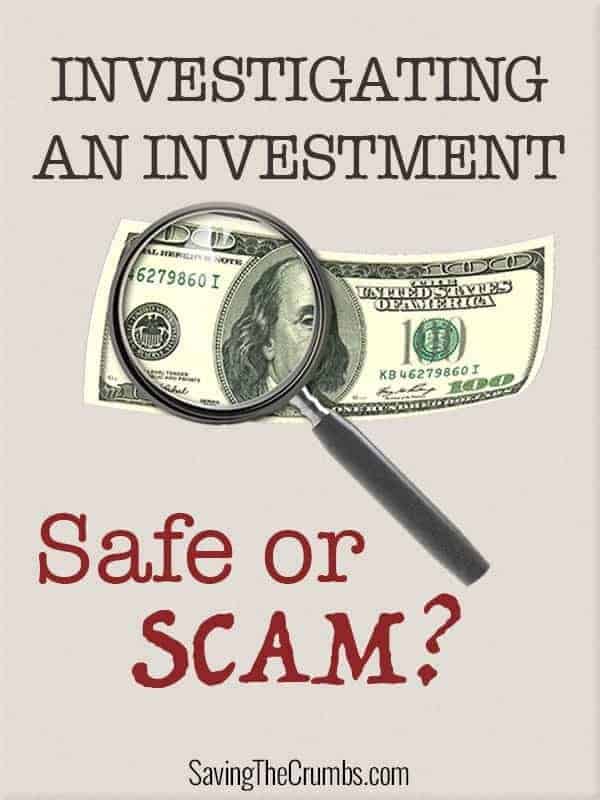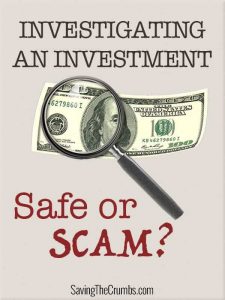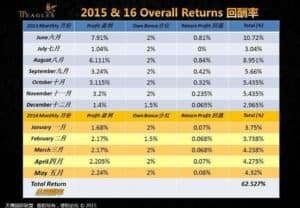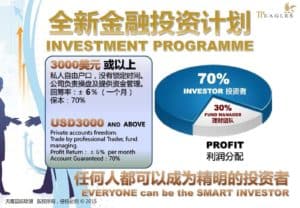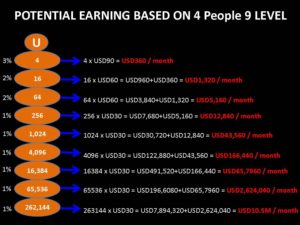As I’ve shared before in the post 7 Principles of Investing, there is a panel of guiding principles by which I evaluate all investments. This is the filter through which I screen, and so I’m going to do that with this case today. For the sake of keeping things concise, I’m going to focus on just the following 3 principles:
- Never Invest in Something You Don’t Understand
- Liquidity
- Don’t Speculate. Don’t Try to Get Rich Quick. Don’t Be Greedy.
The Opportunity: TP Eagles
The company in question is called TP Eagles and what I was told was that this company invested in gold. (This company was also frequently referred to as Marigold Global Market Corporation, and the reason why will be explained below.) I suppose the reason why it was so intriguing was because the company seemed to consistently yield over 60%! Yes, you read that correctly, that’s an average of over 5% PER MONTH! You don’t have to take my word for it. Here’s a graphic I pulled from their Facebook page:
Their pitch is that with just $3,000 USD starting capital, you can allow their experts to invest your money for you while you watch your river of passive income roll in month after month. This was one of their Facebook posts (caption is their’s):
“Let our professional expert traders to trade for you and you just have to relax and enjoy 6%+- monthly passive profits”
Moreover, to my friends it seemed to be a safe investment because a number of their friends were successfully getting those returns, plus gold is one of the safe havens in the investment world, isn’t it? Not to mention, there are bonuses added to the monthly returns based on how many people you recruit to join the program and how many they recruit, aka a downline. Here’s another photo from Facebook with the exact words from their post:
“Become a referral up to 9 levels and earn a monthly income of up to USD 10 million every single month”
Not only get 60% returns annually, but get up to $10 million per month? What could possibly go wrong?
If your baloney meter is ringing, you’re not alone. In perhaps a bit of irony, the TP Eagles website went offline during my research for this post.* That’s why I quickly downloaded the graphics I needed from Facebook in case the links no longer work. Whether that’s foreboding of things to come, I’ll leave you to decide after reading through the rest of this post.
All right, enough dilly-dallying. Time to get to the main event.
Never Invest in Something You Don’t Understand
Perhaps the single most important rule in investing is this first one. But what do we actually need to understand? Namely, the answers to the following 4 questions:
- How does it make money? (Or how does the investment work?)
- What are the costs?
- How can it lose money? (Or what are the risks?)
- What are the rules?
Let’s go through each of these one by one for TP Eagles.
How Does It Make Money? How Does It Work?
As stated earlier, my friends understood TP Eagles to be a gold investment. That’s not quite the case. Investing in gold typically means buying stake in physical gold (i.e. bullion, coin, jewelry, etc.) or gold operations (i.e. companies, mines, refiners, etc.) whether directly or indirectly (through funds, notes, etc.), but TP Eagles doesn’t do any of that. TP Eagles states that they specialize in forex (short for “foreign exchange”) which is a form of investing based on speculating on the price fluctuations between currencies. They conduct what’s called “spot gold” trading which is a form of forex, where gold happens to be one of the currencies they are trading against. So to be more accurate, TP Eagles is a spot gold trading or forex investment. Forex trading is usually highly leveraged (meaning with borrowed money), which greatly magnifies the risk of this form of investing.
But none of that really matters.
The reason is because I don’t believe TP Eagles makes money through forex at all. You notice how they are promoting and incentivizing the recruiting and referrals? Why would a legitimate investment firm that can pull in 60% annually need a referral program?! There would be a tidal wave of interest to get in.
So why do they need to do it?
Because that’s the classic tactic of pyramid schemes (or Ponzi schemes or “money games” as it is colloquially known in that part of the world). The early adopters near the top of the pyramid get paid their massive returns through the influx of money below them.
Just think, Warren Buffett is considered one the greatest investors in the world, and he gained that reputation by producing a “measly” 19% annual return over his 5 decade career (and he certainly never guaranteed that amount). That’s a tiny pittance compared to what this firm is promising! Imagine, an investment group that can beat Warren Buffet by over 300%, and the world hasn’t beaten a path to their door!
For sake of comparison, Bernie Madoff, architect of the largest Ponzi scheme of all time ($65 billion!) only promised a steady 10-15% return per year. That’s probably why he wasn’t caught for so long.
But know that these types of scams are effective because some people DO get the promised returns. Otherwise, no one would join. And frequently those who have received the payout are emboldened by the apparent legitimacy and security of the investment and they pour more capital in. But sooner or later, the good times will come to an end, and someone’s going to be left holding the bag.
What Are the Costs?
The lack of transparency on costs is alarming. One of the graphics above states that there’s a 70% Client/30% Manager split. But is that only on the profits? Is that on all assets? Do they charge 30% even if there is a loss or is it only if there is gain? They didn’t say, and believe me, I was looking.
But more important than that is what they DID say. The following is what I found in their client agreement with also some of my thoughts:
- Section 10m. (Client Money) If the client’s trading account is inactive for at least a calendar year, TP Eagles reserves the right to charge an account maintenance fee of USD15 (or currency equivalent) per month in order to maintain the trading account open.
- Al: But wait, this is passive income where they’re supposed to be trading my account. Why should I be charged an account maintenance fee for inactivity when I’m not SUPPOSED to do anything? Plus elsewhere in the document, it states the inactive period is 3 months. So which one is it?
- Section 11c. (Charges) TP Eagles reserves the right to change, from time to time, any of the charges applicable to clients when trading financial instruments without prior written notice to the latter; the most up-to-date information shall be found online at www.tpeagles.com.
- Al: Umm…so basically, TP Eagles can change the charges at any time without letting me know?
- Section 11d. (Charges) The client should note that any applicable charges shall be instantly deducted from his / her trading account.
- Al: Oh! And any of those charges that they changed without letting me know can instantly be deducted from my account too? So I guess they can change the charge to 100% of my account balance any time, withdraw it from my account, and never let me know. How convenient!
I guess the question about the 70/30 split above is irrelevant since they can change their costs any time anyway!
How Can It Lose Money? What Are the Risks?
We’ve already established that the costs can change at any time. But what are the other risks to my investment? Supposing that this is actually a legitimate forex trading firm (of which I am dubious), it comes with all of the risks associated with forex—which are many. Just remember that risk and returns are always proportional. An investment yielding 60% annually will most assuredly be vastly higher risk than an 8% one.
But suppose that this is indeed a pyramid scheme as I am smelling? Sooner or later these pyramids collapse because there’s just not enough new money flowing in to maintain the payouts to those up top. Once that point gets close, usually several things happen: People at the top start bailing out (of course, we wouldn’t know when they were), the firm begins running into “issues” that compromise their ability to repay, and eventually they go dark all together. (Maybe say, their servers get hacked and their website goes down or something like that…)
Further down in their client agreement, this is what it says in Section 24. FORCE MAJEURE EVENT (emphasis mine):
- A force majeure, is as an event or circumstance, including but not limited to any natural, technological, political, governmental, social, economical or similar event or circumstance that occurred after a transaction in a financial instrument and such event or circumstance has not been anticipated at the date of entering into the transaction. In addition to the above, a force majeure event may include instances of illegal and similar actions against the TP Eagles servers that may be outside the control of with the client or TP Eagles.
- If TP Eagles determines that a force majeure event occurred, without prejudice to any other rights of the client under the Service Agreement, TP Eagles may:
- increase margin requirements; and/or
- increase spreads; and/or
- decrease leverage: and/or
- close-out, in good faith, any open positions at a price that TP Eagles considers reasonable; and / or
- request amendments to any closed positions; and / or
- suspend the provision of investment and / or ancillary services to the client, and /or
- amend any of the content of the Service Agreement on the basis that it is impossible for TP Eagles to comply with it.
Notice specifically that according to the last two points, if the situation demands it, the firm can suspend all services and alter anything in this service agreement that they can’t comply with! In an appendix of the agreement, they have another statement on Force Majeure that puts it tersely: “In case of a Force Majeure, the client shall accept any loss arising from it.”
Let’s just say that should someone lose their money with this firm, they certainly can’t claim that they weren’t forewarned.
What Are the Rules?
So what recourse does the investor have should this company make like a bandit with their money? What regulations and customer protections are there in place? As you’ve already suspected, not much. Here’s what it states in the client agreement:
- Section 25a. GOVERNING LAW AND JURISDICTION. The client accepts that the Service Agreement and any investment and / or ancillary services provided under it by TP Eagles shall be governed by the law of the Belize.
- Section 25b. GOVERNING LAW AND JURISDICTION. Any proceedings and their settlement that may involve TP Eagles and the client shall take place in the competent courts of the Belize.
Wait, what?! What does Belize have anything to do with this?
As it turns out, TP Eagles is only an affiliate of the mother organization called Marigold Global Market Corporation (MGMC) which is registered in Belize but operates in Hong Kong.
With a few clicks on Google, I unearthed some other highly unsettling things regarding both TP Eagles and MGMC. Here are the quick bites with a few links:
- The Central Bank of Malaysia listed TP Eagles as one of many financial firms that are not authorized or approved to conduct business in Malaysia. Direct link to PDF.
- The Money Authority of Singapore issued a public statement warning against MGMC as offering unauthorized or illegal financial services.
- Some individuals associated with a fraudulent Hong Kong bitcoin exchange were also found to be linked with MGMC, and it was discovered that the fraudulent bitcoin exchange and MGMC shared addresses in Hong Kong.
- In a post on how to determine whether a forex broker is genuine or a scam, TP Eagles is included in the list of known scam forex brokers.
These things taken together are obviously highly suspicious, but let it be clearly understood that should something bad happen, there is NO RECOURSE for individuals who send their money offshore, away from the protection of their country’s laws and regulations, to a firm in Hong Kong that’s regulated in Belize. And mark my words, sooner or later, this operation will collapse like all pyramid schemes before them.** (Most pyramid schemes have a life-span of a couple of years, and since it looks like this firm appeared on the scene 2 or 3 years ago, I suspect the end won’t be long now.)
No Substitute for Doing Our Homework
I know that many people have no interest in or simply don’t want the hassle of learning the foundations of investing. I can certainly understand that. But the danger is when such individuals think that they can offload the responsibility to someone else, whether it’s a friend who seems knowledgeable or some seemingly professional investment firm. The fact of the matter is, our money is our responsibility and ultimately we will suffer the consequences—not those to whom we’ve delegated the duty. If there’s a loss, we’re going to be the one left holding the bag, no matter who we thought we had delegated responsibility to. More significantly, when God takes account on what we did with the “talents” He left in our stewardship, we can’t blame someone else!
The research for this post took me less than 2 hours. (Writing this post took longer than that!) The point is, it doesn’t take a full-blown forensic investigation to properly do our homework.
To put it bluntly, to invest our money in something we don’t understand, whether directly or indirectly through a delegate, is irresponsible. Better to sit there and do nothing if we aren’t willing to put forth the effort to properly educate ourselves first.
Liquidity
At this point, someone who has money in such a scheme might be thinking, “I better pull my money out!” Indeed, that is what I suggest they do. However, since that is precisely what pyramid schemes can’t afford to let happen, most will twist their arm to keep them from doing that. They may incentivize them with higher rates or bigger bonuses to stick with it “just a little longer” to keep them locked in. Or they may simply delay the process.
In fact, their ever-helpful client agreement spells it right out for us (emphasis mine):
- Section 10d. (Client Money) The client has the right to withdraw, at any time, any part of the Funds equal to the free margin that is available in the relevant trading account provided that there are Funds available. It should be noted that such request may take up to three (3) business days in order to be processed. MGMC reserves the right to request additional information and / or documentation to satisfy itself that the request is legitimate. In addition, MGMC reserves the right to reject such a request if it deems that this may not be legitimate. The client accepts that under such circumstances there may be a delay in processing the request.
It’s right there. THEY have the right to deem whether a request to withdraw is legitimate or not. And if you disagree? Tough, see you in court…in Belize.
Many times these pyramid schemes release monthly statements that show the gains and earnings of their investors (they trumpet their returns on their Facebook page), but financial statements can be easily fabricated so the true proof is getting cash in hand. So to anyone involved with schemes like this who think they are making money hand over fist, just remember that the real test is whether you can withdraw.
So go ahead, try to withdraw, if you’re early enough that they’re still able to pay out, you’re fortunate and you can thank me later.
Don’t Speculate. Don’t Try to Get Rich Quick. Don’t Be Greedy.
If it feels like a pyramid scheme, looks like one, sounds like one, behaves like one, and smells like one, it probably is a pyramid scheme! Some of my astute readers are probably wondering how anyone can get swept up into something so obviously shady as this. The answer is actually quite simple.
Greed.
The allure of 60%+ returns per year with huge recruiting bonuses helps us build those castles in the sky in our minds, and we lose all sense of reason and caution. We gloss over suspicious things, justify questionable statements, and ignore clear warning signs that we otherwise would heed in more rational moments. Greed stirs up our basest passions, it gets us into trouble, and it causes great harm.
“But what if it’s legitimate?”
“But my friends say that they’ve actually gotten their initial capital back already!”
“Everyone is getting in and no one’s gotten hurt!”
“My neighbor who has a lower IQ than me is making money! I’m going to look like a loser!”
“What if I miss out?!”
These are the burning questions that lead people down the slippery slope of unhinged speculation.*** It’s FOMO at its worst. It’s tapping into the most visceral parts of our carnal nature. It triggers intense emotions. And this is the precise cocktail that impairs our judgment and leads us to do stupid stuff.
But the question really should be, “SO WHAT if it’s legitimate?” If we have managed our financial lives holistically where we’re getting out of debt, have an emergency fund in place, live on less than we make, save consistently, invest prudently, and are on a conservative path to meeting our future needs, we won’t need to dabble with such unregulated and, frankly, unbelievable forms of speculation. At that point, we will possess something worth far more than 60% returns—CONTENTMENT.
Today it might be this spot gold/forex opportunity. Tomorrow it might be something else that’s more subtle. Regardless of what it might be, let me be abundantly clear about this, if your financial situation somehow REQUIRES you to chase such impossibly high returns like what’s promised here, then you’re doing something wrong. Really. Wrong. On the flipside, if your situation does NOT require it and you’re still chasing them, then I’ve got just one question for you.
Why so greedy, bruh?!
An Appeal to Principle
Perhaps what makes me most disappointed is how it is the Christians who frequently get the most caught up in such scams. In nearly all cases that I can recall, it’s people in the church who go the most nuts over this kind of stuff. It is particularly concerning because, more often than not, it overshadows our Christian witness. It interrupts ministry, ruptures relationships, and casts disrepute on God. When we are more enthusiastic about recruiting someone to join an “investment opportunity” than we are about inviting them to be a disciple of Jesus, something is wrong.
As I’ve tried to promote by principle and practice on this blog, our personal finances are to be a glory to God. Our savings and investments are to help give us greater freedom and increased ability to serve the Lord—not to REPLACE our service to the Lord. The love of money is still the root of all evil, and even us believers are not immune to its contagion. Let us learn to be content with what the Lord has given, consult principle in choosing our investments, and be wise to manage His resources carefully. Remember, the world is watching.
To read more on what I’ve written about investing, feel free to peruse the “Investing” category of posts, or you can check out some of the the following posts that I think are pertinent to this discussion:
- The Morality of Mutual Funds, Part 1: Am I Indirectly Supporting Evil?
- The Morality of Mutual Funds, Part 2: 7 Principles of Investing
- The Morality of Mutual Funds, Part 3: Common Alternative Investments
- The Magic Number: 8% Investment Returns
- Book Review: The Simple Path to Wealth by JL Collins
- How Much Do I Have to Earn to Be Rich?
- Of Speculating, Investing, and Tulips
- The Secret Ingredient to Investing
- Investing: A Game of Risk
- A New Definition of “Rich” and a Simple Formula to Get There
- Everyday Investing
*Since I’m not sure whether the TP Eagles site will be available when this post goes live, you can verify that the site did previously exist using the Wayback Machine here: https://web.archive.org/web/20170114163037/http://home.tpeagles.com/
**Just not long ago, another popular Malaysian-based forex-related “money game”/pyramid scheme called JJPTR went up in smoke and was all over the news. TP Eagles is likely not far behind.
***In a previous post entitled Of Speculating, Investing, and Tulips, I shared how the Dutch fell sick to this illness during Tulipmania where they speculated on tulips. Even today, we are not immune.

